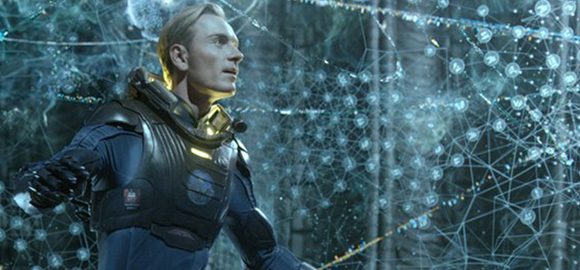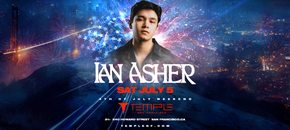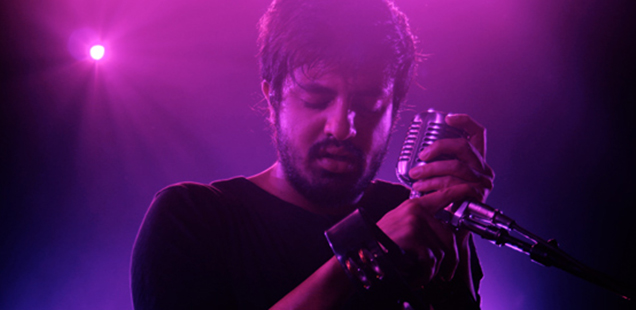Movie Review: Prometheus
Ridley Scott returns to sci-fi after nearly 30 years with Prometheus, and the stakes couldn’t be higher.
Loosely taking place in the Alien universe Scott introduced to the world, it recalls his original film as well as his cult follow-up Blade Runner. While it may not surpass, or even equal those now classic films, it’s a return to form for the director and a return for the classic action/sci-fi genre that’s been sorely missed on the screen for years.
What began in development as a strict prequel to Alien, it eventually morphed into it’s own original property although it still exists within the same world. Prometheus‘ action and pacing is similar to that original film, perhaps a bit too much at times, yet it’s also heavily steeped in philosophy, especially the nature of being human, similar to Blade Runner. However despite these obvious, and sometimes purposeful, links to Scott’s most well known films, it is able to create a mythology of its own and become its own entity.
It’s also a throwback to classic sci-fi and action films foregoing much of the CGI elements that have dominated both genres in recent years. While CGI does exist, it’s used sparingly and is usually undetectable as Scott preferred utilizing real sets and practical effects, creating a more realistic feel that many recent films haven’t had. But the visuals are only half the battle for a film like this. Fortunately the story holds up rather well, with some flaws, and the acting is mostly spot on.
Opening in 2089, Elizabeth Shaw (Noomi Rapace) and her colleague, and lover, Charlie Holloway (Logan Marshall-Green) discover similar star maps, including large people they call “Engineers”, amongst several, unconnected ancient civilizations. Believing these “Engineers” to be the true creators of the human race, they set out to a distant moon mapped out in the paintings. Funded by the elderly Peter Weyland (Guy Pearce) and his Weyland Corporation, Shaw, Holloway and a large crew are shipped off, in stasis, along with the android David (Michael Fassbender) who monitors their two year-long voyage before being woken up. The crew consists of Janek (Idris Elba), captain of the Prometheus ship, his pilots Chance (Emun Elliot) and Ravel (Benedict Wong), botanist Milburn (Rafe Spall), geologist Fifeld (Sean Harris), medic Ford (Kate Dickie) and Weyland employee Meredith Vickers (Charlize Theron) who’s there to oversee the mission. Because this is a film that relies heavily on suspense and anticipation detailing much more of the plot would rob viewers of much of the surprise and fun of the film, but it’s safe to say that their mission doesn’t go as smoothly as they planned.
From the get-go Vickers is cold and somewhat dubious about Shaw and Holloway’s “thesis,” as David humorously refers to their theory about the Engineers, creating an immediate power dynamic and split between her and the rest of the mostly blue-collar crew. Vickers could come off as an inconsequential and trivial internal antagonist for the crew, but Theron is able to pull her off as a well rounded character that adds much to the story.
What’s commendable about the film is its meditation on philosophical matters like that of human nature. The crew’s journey to hopefully, at least in the minds of Shaw and Holloway, discover the true origins of humanity from an alien race is mirrored through the crew’s relationship with David, the android creation of Peter Weyland. As the crew travels in stasis to their destination, David wanders around the the ship alone, playing basketball, dying his hair blonde in admiration of his icon T.E. Lawrence in Lawrence of Arabia (which he’s seen watching) and even eating. Even though he looks and acts like a human, it’s obvious he’s not one and he’s immediately set apart from the rest of the crew (including Vickers), even before they’re awake.
Fassbender contributes possibly the best performance in the entire film as he’s able to capture the inherent inhumanity of David while injecting it with glimmers of possible empathy, mostly through the humor David provides as the film’s somewhat comic relief character. In fact, David is probably the film’s most complex character because he is an android. This is best described in an initial scene as the crew disembarks from the ship to explore a cave when Holloway asks David why he’s wearing a suit if he doesn’t even breathe. His response is that he’s made to look human in order to make his companions more comfortable in his presence, and this means acting like a human in all situations. It’s a curious quip that at once endears him to humanity while firmly setting him against the rest of his companions.
Of course, the first question for many is how does Noomi Rapace stand up to the original female protagonist Ripley, portrayed by Sigourney Weaver? Rapace, creating an icon in her own right as Salander in The Girl with the Dragon Tattoo trilogy, is a spirited choice for lead Elizabeth Shaw but only time will tell if she truly holds a candle to Weaver’s Ripley. Shaw is a different character than Ripley, playing a scientist rather than a militant. Perhaps a bit too cliché is Shaw’s religious beliefs, manifested in the cross worn around her neck, that are in obvious direct contradiction with the mission and her pursuit of scientific answers. But Scott doesn’t overdo the dichotomy, even if it does shroud Shaw in a bit of blandness. Still Rapace is able to rise above it and create Shaw as a protagonist forced to rise to the challenges set before her. If she seems less gung-ho than Ripley, that should be expected. She begins the film as a thinker, not a fighter.
Unfortunately, Prometheus does dismiss some of its details in favor of its overarching philosophical presence, but it honestly doesn’t diminish the film in any large ways. It can be cliché and lack some common sense at times but Scott and writer Damon Lindelof (Lost) create a unique enough universe and story that the missteps are more quibbles than major flaws. Sure, they cheapen the film in spots but they don’t drag the film down enough to destroy it as a whole. In fact, one of the major achievements of the film is setting up those initial questions and theories, both philosophical and practical, that are retained throughout the entirety of the film. And, without spoiling too much, it sets itself up for a sequel better than most films in recent history, while also making it stand on its own as a complete entity.
It may not be the home run many are hoping for from the director of sci-fi classics Alien and Blade Runner, but it is one of the best action/sci-fi films in a long time. Scott reminds viewers that while visuals do play a big part in science-fiction, it’s the stories and characters that truly transcend, as with any film. Ultimately, Prometheus proves that Ridley Scott is one of the greatest sci-fi directors, even with a three decade absence, and it’s a satisfying return to the classic sci-fi genre he helped create.
Showtimes and Tickets






